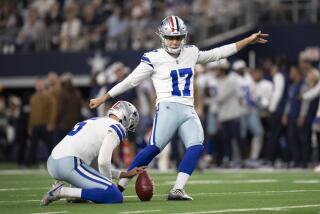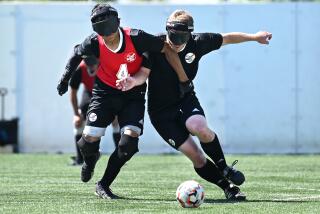NFL Coach With Cerebral Palsy Has Winning Outlook
Like so many boys, Doug Blevins dreamed of being a football hero. But two things separated him from most of his peers. The first, cerebral palsy, meant he would never be a player. The second, ferocious determination, would make the dream a reality, in an altered form.
“Since I was handicapped, I knew I’d never play a down,” Blevins said. “But I was set on this goal, making it to the National Football League. I knew that, whatever I did, I couldn’t be pretty good at it. I had to be the best in the country.”
Blevins, now one of the nation’s foremost authorities on kicking a football, achieved what a lot of folks in his Appalachian foothills hometown thought impossible. He became the Miami Dolphins’ kicking coach. He made it to the NFL.
From his souped-up aqua-and-white wheelchair, Blevins educates Dolphin kickers and punters in the nuances of leg swing, toe angle, hip placement and timed delivery.
Blevins, 37, turned what might have been a run-of-the-mill lifelong football obsession into a dogged career trajectory. With pro ball as his goal, young Blevins looked for a way to get into the game. Coaching was a tantalizing possibility.
In eighth grade, Blevins hung out with the Abingdon, Va., high school jocks, giving them pointers on ball-playing. They listened to him. He knew his stuff after spending hours engrossed in football guides, filling notebooks during televised games and obsessively reviewing instant replays.
Blevins’ mother, Linda LaFon, who was raising him alone since her divorce in 1975, challenged her son to keep asking “why not?” She had forced the county schools to change their rules and admit him, even though this meant, in the ramp-less town of Abingdon, that Blevins’ classmates had to carry him up the steps of his high school.
Now Blevins turned his attention to kicking. Of all the activities in football, it was one of the least studied. Yet a kick could win or lose a game.
Never mind that, at the time, there was only one NFL kicking coach, Dallas Cowboy Ben Agajanian. (Today, only the Dolphins and the Cowboys have kicking coaches.) This was a vocation that Blevins wanted badly. He wrote to Agajanian, asking for tips. Agajanian sent him a package of brochures, pamphlets and diagrams of kicking techniques and mechanics.
Emboldened, Blevins began attending kicking seminars and going to kicking camps. While other guys practiced, he sat with coaches, picking their brains. At home, he’d accompany his cousin to the field, and have him perform leg swings, hip swivels and anything else his own body couldn’t do. He taped every NFL kicker’s performance, eventually building a library of hundreds of videotapes.
Blevins nailed a football coaching scholarship from the University of Tennessee, before transferring to East Tennessee State University. There, he asked to teach kickers and got his wish. He also met his wife-to-be, Nenita, a fellow student from the Philippines.
After graduating, Blevins coached high school football for five years and formed his own consulting company, Championship Placekicking & Punting.
As his reputation grew, so did his client roster. In 1994, the Jets hired him as a kicking consultant, where he helped then-Jet place kicker Don Silvestri. The following year, he was tapped to consult for the New England Patriots. One of Blevins’ greatest success stories, thus far, is Patriot kicker Adam Vinatieri, who’s now the godfather of Blevins’ son, Roman, 2 1/2.
“My kicking improved after the first session with him,” Vinatieri said. “What’s great about Doug is that he can break it down on so many levels. He can [instruct] a 7-year-old or a National Football League kicker who’s been kicking for 15 years. He brings so much excitement and interest to it.”
*
In the mid-’90s, former Raider punter Leo Araguz also turned to Blevins for help, even after Araguz’s former kicking coach warned him not to. “The guy’s in a wheelchair. What can he know about kicking?” the coach reportedly told Araguz.
But while practicing in Germany, Araguz, who was battling a protracted slump, heard Blevins gently suggest that he change his drop slightly. He tried it. By rotating his hand placement on the football, as Blevins challenged him to do, Araguz ended the slump.
Blevins will tell you he has “a little cerebral palsy.” He dismisses it as an inconvenience. He doesn’t want your sympathy. He wants your respect. So if you say the word “disability”--which he hates--expect a typical Blevins response: “The only disability is a bad attitude.”
“He absolutely refuses to use a disability sticker on his car,” said West Palm Beach, Fla.-based sports agent Diane Cantone. “Each time we drive somewhere, I’m like, ‘Why don’t you use those stickers? We’re passing all these good spaces.’ But no, he’s got to park all the way, far away, in the lot.”
Kickers praise Blevins for his sophisticated approach to the discipline. To Blevins, every kicker has a unique style that must be cultivated. He searches for peccadilloes that might impede a perfect kick: too many steps, tiny steps, too robust a kick, rushing the ball, pivoting the shoulders.
With trusty stopwatch in hand, he drills punters in a “hang time” game, goading them to increase the air time of each successive punt.
He got a big break in 1995 when the NFL hired him to work with its World League kickers. It wasn’t an easy job. Blevins had to help soccer players convert their kicking mechanics to football. In 1997, Dolphin then-coach Jimmy “No Nonsense” Johnson hired Blevins sight unseen, based on his reputation.
“He didn’t know I was physically handicapped until I appeared at his office,” Blevins said. “He was stunned at first. Jimmy thought it was a joke.”
That is, until Blevins opened his mouth about the art and science of kicking. Johnson was convinced.
“He just asked me if it would be dangerous for me to be on the field with the guys,” Blevins said. “I said no. And he said, ‘Well that’s good enough for me.’ ”
Before he moved, Blevins was driving 220 miles round-trip daily from his Vero Beach, Fla., home to the Dolphin training camp in Davie, Fla. He’d coach kickers; churn out nine-page, single-spaced kicking analyses; and not complain about the grueling schedule.
In addition to his Dolphin responsibilities, Blevins is working with up-and-coming kickers such as Joe O’Donnell, formerly with the Florida Bobcats and an NFL aspirant, whom Blevins described as having “a cannon of a leg.”
“I went from last in the [Arena] league to third after working with him,” O’Donnell said. “He takes your style and makes it better.”
“People ask me all the time, what’s the one thing I regret most,” Blevins said. “They ask, ‘Do you miss walking hand-in-hand with your wife?’ ‘Do you miss carrying your son?’ ” But Blevins always responds in the negative; his relations with Nenita and Roman are not wanting.
*
If there’s one thing he wishes for, it’s to put on the aqua-and-blue uniform and get in the game. Not as a kicker, but a hulking linebacker.
“I’m cold, bleeding, it’s late in the fourth quarter,” Blevins said. “The ball snaps and I hit that quarterback so hard, you hear the air escape from his lungs.”
He paused for effect. “You know he’s not gonna get back up. And the announcer turns and says, ‘Ohhh, I just hate to see something like that happen.’ ”
The Blevins’ philosophy of life is simple: “If you stop accomplishing, you stagnate.” So he’s set his sights on two new goals: He intends to build Championship Placekicking & Punting into “the world’s premier kicking company,” and one day become a college head coach.
“You know, even now, with all that I’ve accomplished, there are still people out there who think this is a joke or a publicity stunt,” Blevins said. “[People] who talk to you like it’s a mental handicap instead of just a physical one.
“When all is said and done, I want people to look back on Doug Blevins’ career, and say, ‘he was a helluva football coach.’ Not ‘he was a helluva disabled coach.’ That’s really all I want.”
More to Read
Go beyond the scoreboard
Get the latest on L.A.'s teams in the daily Sports Report newsletter.
You may occasionally receive promotional content from the Los Angeles Times.










